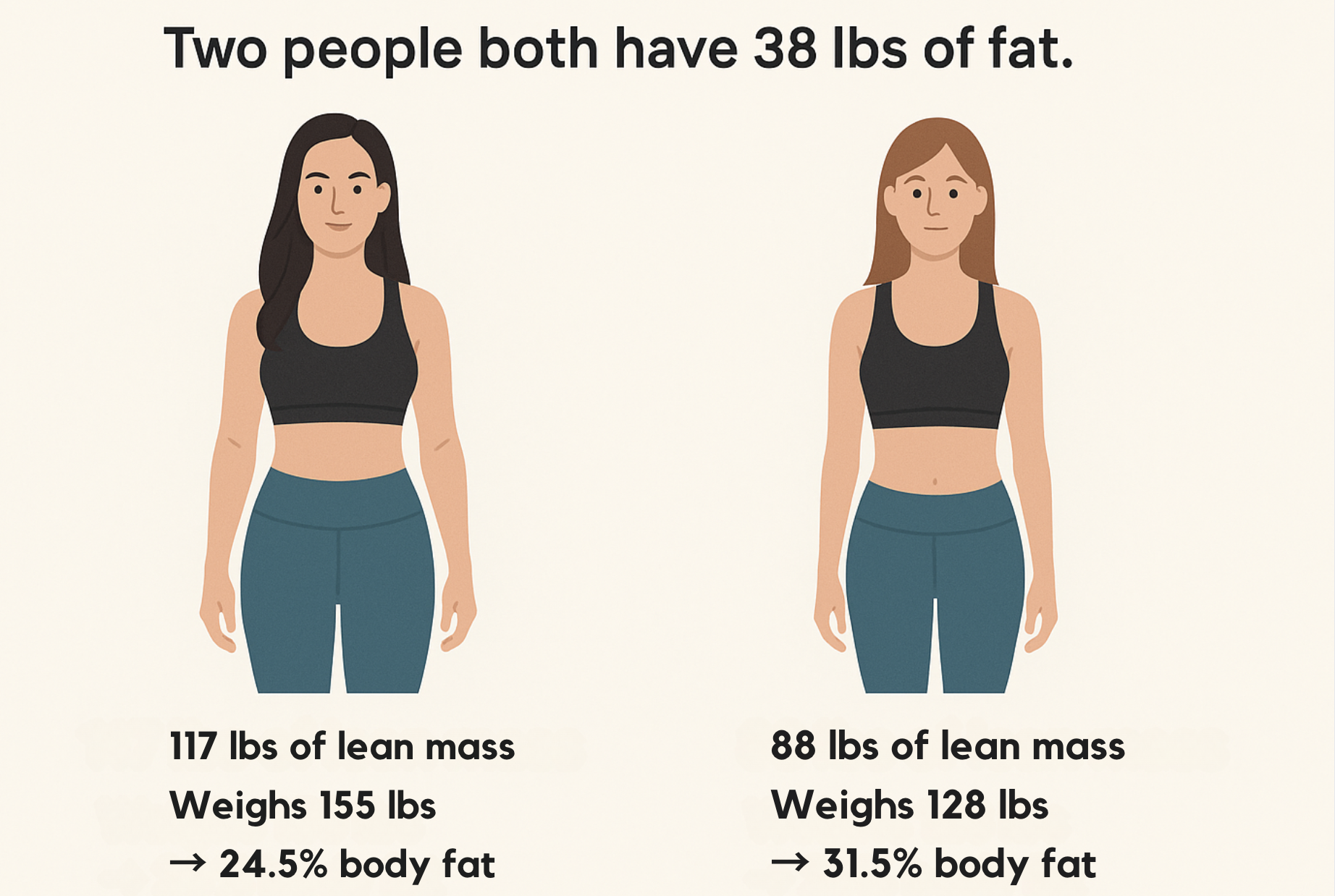Stuck Losing Fat? You Might Be Missing Muscle
“I thought I was just overweight… turns out, I was under-muscled.”
We hear this all the time — especially from clients who’ve been chasing fat loss for years:
👉 Clean eating
👉 Daily workouts
👉 Dropping calories lower and lower
But instead of getting stronger and leaner… they hit a wall. Plateaus. Fatigue. Frustration.
That’s exactly what happened when one DexaFit client booked her scan — and saw something she didn’t expect:
“My body fat percentage was high — not because I had too much fat… but because I didn’t have enough muscle.”
It flipped her whole approach. And changed her results.
🔍 The “Slow Metabolism” Myth, Measured by Data
Most people blame age, hormones, or “just getting older” when fat loss stalls.
But often, what’s really happening is simple:
Your body is adapting to stress and underfueling.
Here’s what that looks like:
Resting Metabolic Rate (RMR) drops
Lean mass decreases
Fat storage ramps up
Thyroid and recovery slow down
This isn’t failure. It’s a biological defense.
But it’s not where strength or healthspan are built.
To move forward — you need clarity. And that means testing.
🔬 The 3 Metrics That Break the Plateau
Here’s how we help clients stop spinning their wheels and start making measurable progress:
🔥 RMR: Are You Burning Enough at Rest?
Your Resting Metabolic Rate is the true number of calories your body burns doing absolutely nothing.
Most online calculators? Off by 400–700 calories.
Case Study:
A 42-year-old woman eating 1,500 calories and training 5x/week came in stuck.
Her measured RMR? 1,140 — nearly 500 below predicted.
We added food. Prioritized lifting.
Her RMR rose to 1,420. Fat loss resumed — without cutting further.
💪 DEXA: Is Low Muscle Making You Look Overfat?
The scale can’t tell you what’s muscle vs. fat — and that’s where most people get misled.
It’s not always that you have too much fat… it’s that you don’t have enough lean mass to balance it out.
A DEXA scan cuts through that fog by showing:
How much muscle you're really working with
Whether visceral fat is creeping in
How your body composition stacks up beneath the surface
📊 Example:
Two people both have 33 lbs of fat.
Person A has 117 lbs of lean mass
Person B has 88 lbs of lean mass
Person A: 150 lbs → 24.5% body fat
Person B: 133 lbs → 31.5% body fat
👉 Same fat mass. Different muscle. Different body fat %.
And that changes how your body performs, recovers, and metabolizes fuel.
So when a client says “I just need to lose fat,” we often find the real breakthrough comes from building muscle — not shrinking smaller.
🫁 VO₂ Max: Are You Fueling the Fire or Smothering It?
VO₂ testing isn’t just for endurance athletes.
It shows:
How efficiently your body burns fat vs. carbs
Whether your training zones are helping or hurting
How quickly you recover and use oxygen
Example:
One client doubled their fat oxidation in 6 weeks — not by training harder, but smarter.
We used VO₂ data to dial in their heart rate zones, blending zone 2 cardio with weekly intervals.
The result? Less fatigue. More energy. Sustainable fat burn.
🔄 What “Feeling Stuck” Actually Means
When someone says “nothing is working,” we rarely need them to do more.
We need them to train with precision. Eat in alignment with their biology. And stop relying on guesses.
Here’s how we build the plan:
❓ "But Doesn’t Metabolism Just Slow Down With Age?"
Sure, it can — but more often it’s the inputs that change:
You’ve lost muscle
You’re eating too little
You’re not training in the right zones
You’re flying blind, not testing
Once you know what’s happening inside your body, the path forward becomes obvious — and far more effective.
🧭 Ready to Trade Frustration for Forward Motion?
Whether you’re 29 or 69, you deserve to feel strong, energized, and in control.
Start by asking:
Am I actually stuck… or am I just under-muscled?
Because knowing the answer changes everything.
👉 Book Your RMR + DEXA + VO₂ Assessment
And turn the unknowns into momentum.


